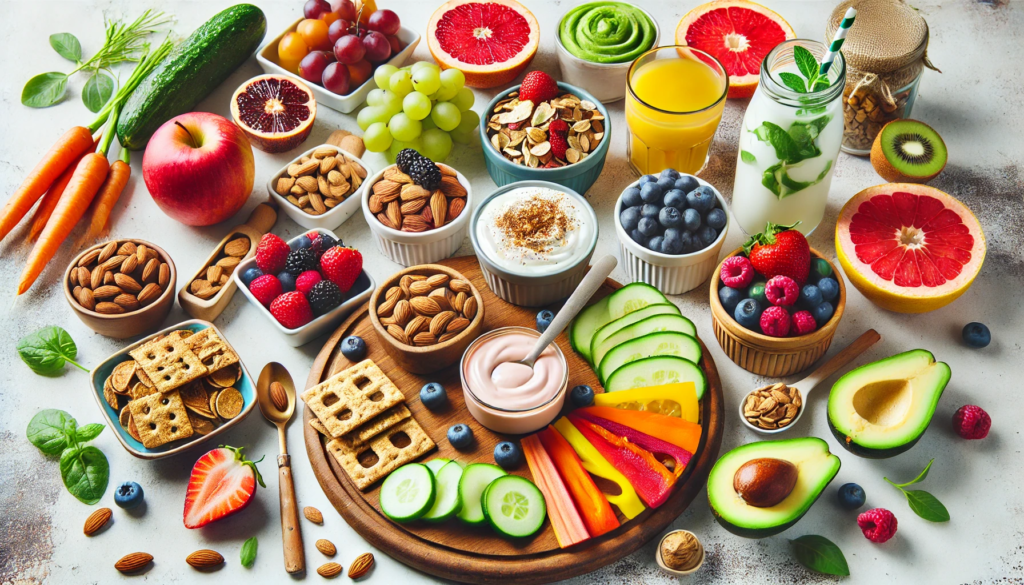Snacking can be a great way to maintain energy levels and curb hunger between meals. However, it’s important to choose snacks that are not only tasty but also nutritious. The following ideas offer a range of healthy snacks that are easy to prepare, nutrient-dense, and satisfying.
Fresh Fruits and Vegetables
1. Apple Slices with Nut Butter
- Sliced apples paired with almond or peanut butter provide a balance of natural sweetness and protein. The fiber in apples and healthy fats in nut butter make this a filling snack.
2. Carrot Sticks and Hummus
- Crunchy carrot sticks dipped in creamy hummus offer a satisfying combination of textures and flavors. Hummus provides plant-based protein and healthy fats, while carrots are rich in beta-carotene.
3. Bell Pepper Strips and Guacamole
- Colorful bell pepper strips served with guacamole are not only visually appealing but also packed with vitamins, minerals, and healthy fats from avocados.
4. Cucumber Slices with Greek Yogurt Dip
- Fresh cucumber slices dipped in Greek yogurt mixed with herbs create a refreshing and protein-rich snack. Greek yogurt is a great source of probiotics and calcium.
Nuts and Seeds
5. Mixed Nuts
- A handful of mixed nuts, including almonds, walnuts, and cashews, provides healthy fats, protein, and fiber. Nuts are also a convenient and portable snack option.
6. Trail Mix
- Homemade trail mix with a blend of nuts, seeds, dried fruits, and a few dark chocolate pieces offers a mix of nutrients and a touch of sweetness. It’s a great on-the-go snack.
Dairy and Dairy Alternatives
7. Yogurt with Granola and Fresh Fruit
- Greek yogurt topped with a sprinkle of granola and fresh berries makes for a delicious and nutrient-rich snack. The yogurt provides protein and probiotics, while the granola and fruit add fiber and antioxidants.
8. Cottage Cheese with Pineapple
- Cottage cheese paired with fresh pineapple chunks is a refreshing snack that combines protein and natural sweetness. It’s a great option for those looking for a low-calorie yet satisfying treat.
Whole Grains and Legumes
9. Whole Grain Crackers with Avocado
- Whole grain crackers topped with mashed avocado and a sprinkle of sea salt offer a crunchy and creamy snack rich in fiber and healthy fats.
10. Roasted Chickpeas
- Roasted chickpeas seasoned with your favorite spices are a crunchy, high-protein snack. They’re easy to prepare and can be flavored in various ways, from spicy to savory.
Smoothies and Drinks
11. Green Smoothie
- A green smoothie made with leafy greens (like spinach or kale), a banana, a handful of berries, and a splash of almond milk is a nutrient-packed drink. It’s a great way to get your daily dose of fruits and veggies.
12. Infused Water
- Stay hydrated with water infused with slices of lemon, cucumber, and fresh mint. It’s a refreshing and flavorful alternative to sugary drinks.
Sweet Treats
13. Dark Chocolate and Almonds
- A small serving of dark chocolate paired with a handful of almonds offers a satisfying mix of sweetness and crunch. Dark chocolate is rich in antioxidants, while almonds provide healthy fats.
14. Chia Pudding
- Chia seeds soaked in almond milk with a touch of honey and topped with fresh fruit make for a delicious and nutritious snack. Chia seeds are high in omega-3 fatty acids and fiber.
Conclusion
Healthy snacking doesn’t have to be complicated or boring. By choosing a variety of nutrient-dense foods, you can enjoy satisfying snacks that support your overall health and well-being. Whether you prefer fresh fruits and vegetables, nuts and seeds, or dairy and whole grains, there’s a healthy snack option for everyone. Remember to listen to your body’s hunger cues and enjoy these snacks in moderation as part of a balanced diet.
Frequently Asked Questions
What makes a snack healthy?
A healthy snack is typically nutrient-dense, providing essential vitamins, minerals, and macronutrients (proteins, fats, and carbohydrates) without excessive calories, sugars, or unhealthy fats. It should also be satisfying and help sustain energy levels.
How often should I snack?
The frequency of snacking depends on individual dietary needs and preferences. Some people find that eating small, frequent snacks helps maintain energy and prevent overeating at meals, while others prefer fewer, more substantial meals. It’s important to listen to your body’s hunger signals.
Can I eat snacks if I’m trying to lose weight?
Yes, snacks can be part of a weight-loss plan if they are nutrient-dense and consumed in appropriate portions. Healthy snacks can help manage hunger and prevent overeating, making it easier to stick to a balanced diet.
Are there any snacks to avoid?
It’s best to limit snacks high in added sugars, refined grains, and unhealthy fats. Processed snacks like chips, candy, and sugary beverages can contribute to weight gain and other health issues.
What are some easy snacks for on-the-go?
Portable snacks include fresh fruit (like apples or bananas), mixed nuts, yogurt cups, whole grain crackers, and trail mix. These options are convenient and can be easily packed for travel.
How can I make snacks more filling?
To make snacks more filling, include a combination of protein, fiber, and healthy fats. For example, pair fruit with nut butter, vegetables with hummus, or whole grain crackers with cheese. This combination can help keep you satisfied for longer.



